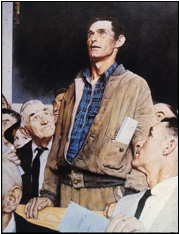Yesterday, the U.S. Supreme Court, led by Chief Justice John Roberts, delivered another fatal blow to a censorship doctrine that has pervaded the federal election system for decades, adding new life to the First Amendment that has been largely frozen since the McCain-Feingold campaign restrictions went into effect in 2002.
The first blow was delivered in the Wisconsin Right to Life v. Federal Elections Commission (2009) case. In that case, the so-called “influencing language” standard whereby any speech that might “influence” elections (even simple issues ads) could be regulated was struck down.
Chief Justice Roberts, writing the majority opinion, stated, “We conclude that the speech at issue in this as-applied challenge is not the ‘functional equivalent’ of express campaign speech. We further conclude that the interests held to justify restricting corporate campaign speech or its functional equivalent do not justify restricting issue advocacy, and accordingly we hold that BCRA §203 is unconstitutional as applied to the advertisements at issue in these cases.”
Famously, Roberts also wrote, “Discussion of issues cannot be suppressed simply because the issues may also be pertinent in an election. Where the First Amendment is implicated, the tie goes to the speaker, not the censor.” As applied to issue ads that might influence the elections, those were then protected speech. It narrowed the FEC mandate to “express advocacy.”
And now, in Citizens United v. Federal Elections Commission, the “appearance of corruption” excuse to regulate “express advocacy,” whereby any donations and expenditures that might lead to the “possibility” of corruption have now been similarly struck down by the Roberts Court.
This is monumental. All that remains within the FEC mandate is “express advocacy” expenditures resulting in actual corruption. Identifying both the “influencing language” and “appearance of corruption” standards, ALG President Bill Wilson said they had now been consigned to the dustbin of history: These “twin pillars of censorship… have now been struck down by the Roberts Court.”
With Justice Anthony Kennedy writing the majority opinion, the Court stated, “Limits on independent expenditures, such as §441b, have a chilling effect extending well beyond the Government’s interest in preventing quid pro quo corruption. The anticorruption interest is not sufficient to displace the speech here in question.”
In sum, the court ruled against provisions that restricted Citizens United from broadcasting a movie it developed, Hillary: The Movie, that was supposed to air during the 2008 Democratic Primary. In particular, the court ruled that federal restrictions on independent political expenditures by a corporation are a violation of the First Amendment.
The court ruled 5-4 in favor of Citizens United.
Hailing the ruling, Americans for Limited Government President Bill Wilson yesterday praised the Roberts Court as “as the greatest defender of the First Amendment since James Madison wrote it.” “Press” organizations are already crying foul, but only because their media monopoly has now effectively been subjected to the expansive marketplace of ideas.
Now that the First Amendment is in full thaw, there will dawn a new era of free speech; a Renaissance, as it were, of liberty. Simply put, wherein political speech cannot be regulated, thereby bringing an end to decades of censorship by what ALG President Bill Wilson called “arcane, gargantuan censorship boards, laws and regulations that tie up our electoral processes in red tape, restrict speech, and favor incumbents.” Amen to that.


